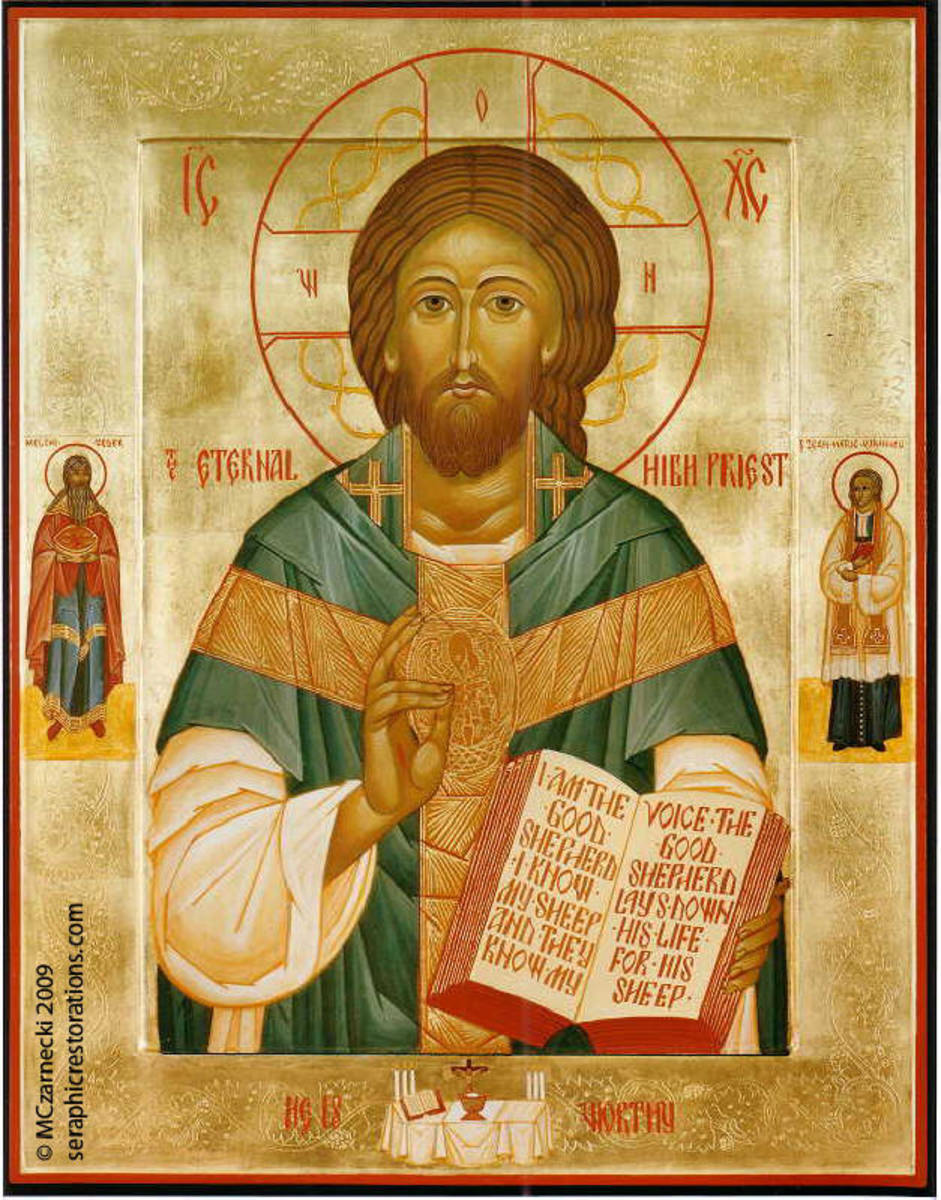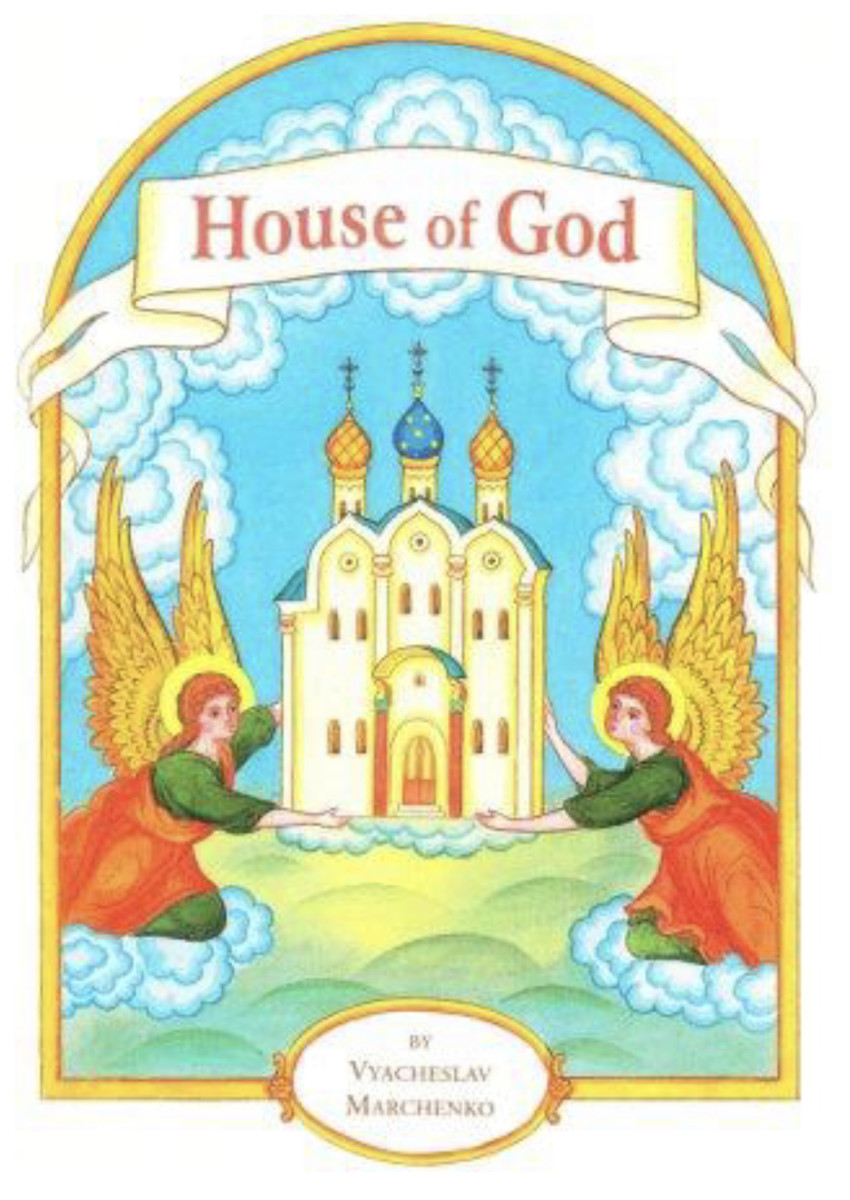Who May Partake of Holy Communion? (The Lord's Supper, Episode V)

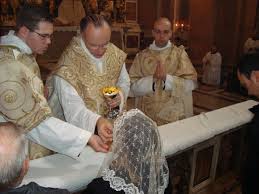

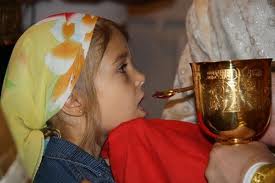
The Eucharist Is the Privilege of Only the Initiated
Then He took the cup, and gave thanks, and gave it to them, saying, “Drink from it, all of you. (Matthew 26:27)
"No one else is permitted to partake of it, except one who believes our teaching to be true…." (Justin Martyr A. D. 150)
The Bible teaches that the Old Testament was comparable to a schoolmaster, whose purpose was to bring mankind unto Christ (Galatians 3:24-251). We further understand that under the Old Covenant physical circumcision was required to accomplish the rite of passage into the covenant family (Genesis chapter 172). So it is, that in the New Covenant the same law applies; except Christian circumcision is not a painful physical act, but a pleasant operation of the Spirit (Colossians 2:11-123). Thusly, we are made to understand by the New Testament (the holy Scriptures of the new covenant) that water baptism is Christian circumcision. It is the seal of the covenant4 and our rite of passage into the Church, which is our New Covenant family. Because the Lord’s Supper is a covenant meal, only those who have been initiated into the covenant through Christian circumcision (i.e. water baptism in the name of Jesus) may biblically partake.
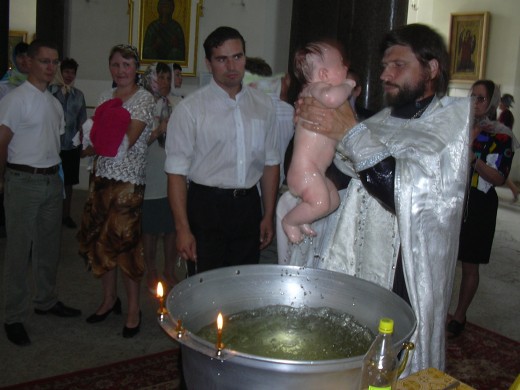

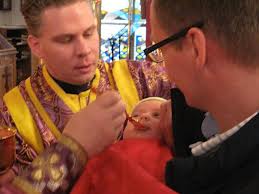
What About Children
In that children of baptized parents are ‘holy seed’5 (as were the children of covenanted Israelites) and, as a result, are born into covenant prerogatives, they are, therefore, candidates for Christian baptism from birth. Being holy to the Lord, infants may receive baptism on the pattern of the Old Covenant circumcision when they are at least eight days of age.6 Since this is the case for our children the question is often asked, “At what age do children begin partaking of the Sacrament?”
Through the centuries different traditions have arisen in different parts of the world, according to cultural norms. In matters where the Bible gives no explicit instruction, Christian tradition may be established by the presence of the Holy Spirit within the Church. Indeed the Holy Spirit, speaking through the collective wisdom of the saints of God, established most every doctrine of the Church before the canon of holy Scripture was ever manifested.7 However, the churches of the West and East are divided on the practice of the first communion, as they are on whether or not the bread is to be leavened or unleavened. What is called The First Communion, or First Holy Communion, is a Western ceremony. It is the colloquial name for a person's first reception of the sacrament of the Holy Eucharist. Communities that practice First Communion believe this event to be very important, as the Eucharist is one of the central focuses of the Lord’s church. Catholic, Lutheran, and other western Christian communities that believe in the Real Presence traditionally practice First Communion. First Communion is not celebrated in the Eastern Orthodox Churches, the Oriental Orthodox Churches or the Assyrian Church of the East which practice infant communion. An exception in the west is some Anglicans who allow infant communion (also called "paedo-communion"8), while others require the previous reception of confirmation, usually during the teenage years.
The people of God have long considered the age of twelve to be the age of passage into a time of accountability for one’s self. This is true, most likely, because this age was well established by the Jews before Christ. Then there is the event of Jesus going up to the temple in Jerusalem at age twelve.9 Regardless of when a Christian community considers its youth to come of age, the crux of the challenge is understanding. At what age does a child understand Christ’s sacrifice for sin?
A particular about partaking of the Lord’s Supper is the necessity for each communicant to discern, by faith, the real presence of the Lord’s body and blood in the elements.10 Therefore, for a child to properly partake of the sacrament, he or she must be of sufficient maturity to believe in the mystery. (There is no requirement to understand, for none completely do—no matter the maturity of age.) This is, no doubt, the feeling of those churches that practice First Communion.
Those, such as the Eastern churches and some Anglicans, who practice infant communion, would have to extrapolate the principle of the sponsor11 (which is applied in infant baptism) onto communion. In this way the faith and understanding of the sponsor is imputed to the infant, without the required faith and understanding of the child. For example, just as the parents (sponsors) answer the baptismal questions at the infants baptism, so too would they say "Amen" the the minister's announcement of "The Body of Christ" and "The Blood of Christ" as these elements are given to the infant. One may support infant communion, then, on the same ground that infant baptism is supported. Before anyone argues against the faith of the parent standing vicariously for the infant it should be considered that those who would make such an argument believe that the children of believers are covered by the faith of their believing parents. So the faith of the parent or sponsor of the Catholic or Orthodox that answers for the infant at baptism and/or communion is really no different than the faith of the parent that stands for the salvation of the child of the Baptist or Pentecostal. If the infant as holy seed is a candidate for covenant prerogatives in regard to baptism, who can deny holy communion.
Initiated Segregated From the General Congregation: Concerning the requirement of water baptism in order to receive the sacrament, it is noted that early church history reveals the Lord’s church dismissed the general congregation before serving the Eucharist to the initiated, i.e. the baptized.12
Christians Who Are Unrepentant In Their Sins: Furthermore, Scripture also states that a Christian, even though baptized, can disqualify him/herself by allowing sin to remain unrepented in his or her life (1 Corinthians 5:7-8,11;13 11:28-2914). However, when repentance is manifested the offending member must be restored to the fellowship of the Covenant meal (2 Corinthians 2:6-1115).
Apostolically Speaking
☩ Jerry L Hayes
Footnotes
1 Gal 3:24-25 Therefore the law was our tutor to bring us to Christ, that we might be justified by faith. 25 But after faith has come, we are no longer under a tutor.
2 Ge 17:10 This is My covenant which you shall keep, between Me and you and your descendants after you: Every male child among you shall be circumcised;
3 Col 2:11-12 In Him you were also circumcised with the circumcision made without hands, by putting off the body of the sins of the flesh, by the circumcision of Christ, 12 buried with Him in baptism, in which you also were raised with Him through faith in the working of God, who raised Him from the dead.
4 Ro 4:11 And he received the sign of circumcision, a seal of the righteousness of the faith... cf Col 2:11-12 In Him you were also circumcised with the circumcision made without hands, by putting off the body of the sins of the flesh, by the circumcision of Christ, 12 buried with Him in baptism, in which you also were raised with Him through faith in the working of God, who raised Him from the dead.
5 Ezra 9:2 For they have taken of their daughters for themselves, and for their sons: so that the holy seed have mingled themselves with the people of those lands: yea, the hand of the princes and rulers hath been chief in this trespass.
6 Ge 17:10-12 This is My covenant which you shall keep, between Me and you and your descendants after you: Every male child among you shall be circumcised; 11 and you shall be circumcised in the flesh of your foreskins, and it shall be a sign of the covenant between Me and you. 12 He who is eight days old among you shall be circumcised, every male child in your generations, he who is born in your house or bought with money from any foreigner who is not your descendant.
7 By the early 3rd century, Christian theologians like Origen of Alexandria may have been using — or at least were familiar with — the same 27 books found in modern New Testament editions, though there were still disputes over the canonicity of some of the writings (see also Antilegomena). Likewise by 200, the Muratorian fragment shows that there existed a set of Christian writings somewhat similar to what is now the New Testament, which included four gospels and argued against objections to them. Thus, while there was a good measure of debate in the Early Church over the New Testament canon, the major writings were accepted by almost all Christians by the middle of the 3rd century.
8 The infant communion among Anglicans may well be an enduring influence of the ancient Celtic church that was more Eastern than Western in its origin and traditions.
9 Lk 2:41-42 His parents went to Jerusalem every year at the Feast of the Passover. 42 And when He was twelve years old, they went up to Jerusalem according to the custom of the feast.
10 1 Cor 11:29 For he who eats and drinks in an unworthy manner eats and drinks judgment to himself, not discerning (to detect with senses other than sight; i.e. through faith) the Lord’s body.
11Irenaeus (c. 130–202) speaks not only of children but even of infants being "born again to God" and three passages of Origen (185–c. 254) mention infant baptism as traditional and customary. Tertullian (c. 155–230) too, mentions that it was customary to baptise infants, with sponsors speaking on their behalf. The Apostolic Tradition, attributed to Hippolytus of Rome (died 235), describes how to perform the ceremony of baptism; it states that children were baptised first, and if any of them could not answer for themselves, their parents or someone else from their family was to answer for them.
12 The Divine Liturgy of St. John Chrysostom, used in the Byzantine Rite, still has a formula of dismissal of catechumens... . The ancient Churches, such as the Roman Catholic and the Eastern Orthodox exclude non-members from Communion under normal circumstances, though the Catholics may allow exceptions. Some Protestant communities including most Lutheran churches practice closed communion and require catechetical instruction for all people before receiving the Eucharist. Many of the stricter communities of the Reformed and Presbyterian denominations practice a form of restricted Communion, which they designate Close Communion (to distinguish it from the closed communion system mentioned above). When it comes time to issue the invitation to come to the table the warning from I Corinthians 11:27-29 is read which is referred to as "fencing the table." Most Protestant communities, including Reformed, Evangelical, Methodist, the Church of Sweden, and Anglicans practice open communion in the sense of not limiting it to members of their own Church alone, but some of them require that the communicant be a baptized person or a member of a partner church.
13 1 Cor 5:7-8,11 Therefore purge out the old leaven, that you may be a new lump, since you truly are unleavened. For indeed Christ, our Passover, was sacrificed for us. 8 Therefore let us keep the feast, not with old leaven, nor with the leaven of malice and wickedness, but with the unleavened bread of sincerity and truth. ... 11 But now I have written to you not to keep company with anyone named a brother, who is sexually immoral, or covetous, or an idolater, or a reviler, or a drunkard, or an extortioner—not even to eat with such a person.
14 1 Cor 11;28-29 But let a man examine himself, and so let him eat of the bread and drink of the cup. For he who eats and drinks in an unworthy manner eats and drinks judgment to himself, not discerning the Lord’s body.
15 2 Cor 2:6-11 This punishment which was inflicted by the majority is sufficient for such a man, 7 so that, on the contrary, you ought rather to forgive and comfort him, lest perhaps such a one be swallowed up with too much sorrow. 8 Therefore I urge you to reaffirm your love to him. 9 For to this end I also wrote, that I might put you to the test, whether you are obedient in all things. 10 Now whom you forgive anything, I also forgive. For if indeed I have forgiven anything, I have forgiven that one for your sakes in the presence of Christ, 11 lest Satan should take advantage of us; for we are not ignorant of his devices.
Read More From the Bishop On Holy Communion
- Who May Administer the Lord's Supper (Lord's Supper, Episode VIII)
There is a message being sent from non-denominational type churches that just anyone may officiate at the Lord's table. Counter to this is the question of the imperfect minister. What says the Bible? - The Lord's Supper (From the Beginning)
This article is the introduction to a series on the Lord's Supper. Jesus instituted this covenant meal and commanded its observance. Here we review the teachings of those whom the apostles taught. - What Is the Lord's Supper, Episode II
In this writing the author gives a brief description of the different terms used by Christians to describe and identify the sacramental meal Christ instituted the night before His death. - Breaking Bread (The Lord's Supper, Episode III)
This writing establishes the biblical phrase "Breaking Bread" as a discriptive name for the Lord's Supper. - The Christian Altar (The Lord's Supper, Episode IV)
As one searches the New Testament for a reference to the Christian altar, it comes as a shock to evangelicals that the Lord's Table is the only New Covenant altar mentioned. Here, we declare it so. - The True Elements (Lord's Supper, Episode IX)
This article covers the question as to the nature of the biblical elements of the Lord's Supper. Christians are divided over leavened or unleavened bread; fermented or unfermented fruit of the vine. - Are Symbols Important to God (A Study in the Lord's Supper, Episode X
In this study we examine the importance of biblical symbols, especially in relation tot he holy Communion. - Bishop's Epistle: The Real Presence (Lord's Supper, Episode XI)
The One Book to Read This Year




